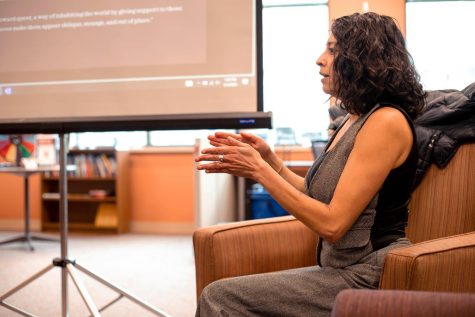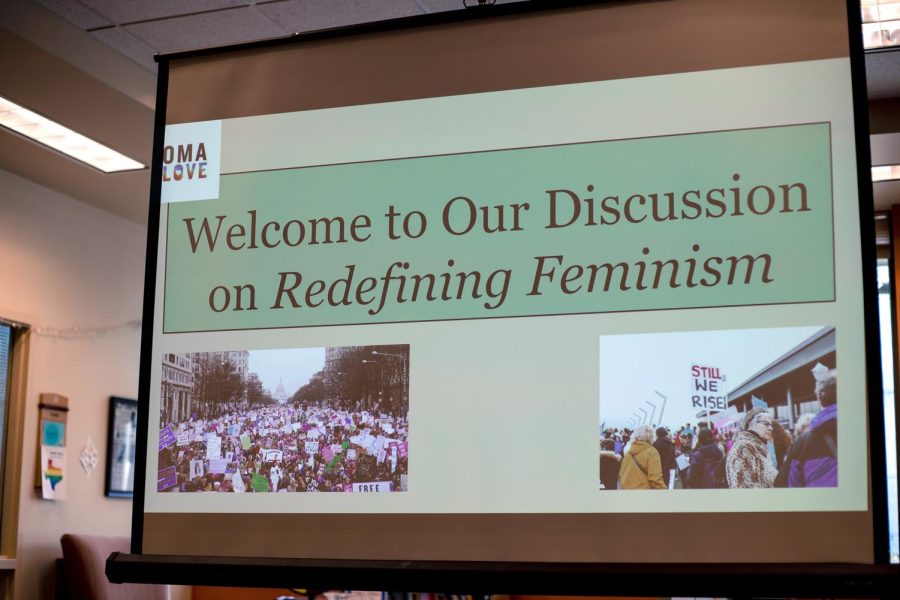Transfeminism is Redefining Inclusion
Redefining Feminisim Discussion PowerPoint
To kick off Women’s History Month, the Office of Multicultural Affairs (OMA) held the discussion “Then and Now: Redefining Feminism.” Students and faculty were invited to have a conversation about how feminism has been defined and include different perspectives to reclaim the movement for what it is: the liberation of all women. White-cisgender women have historically been the dominant narrative in feminism, which has led to an underrepresentation of Queer, Chicana, Black and Eastern women’s voices. The goal of feminism is to empower, but critics argue that, for too long, it has been an exclusive movement that does not address the needs of different demographics.
Feminism can be divided into three separate historical waves. The first wave was the fight for voting and property rights. The second wave began to focus on equality and anti-discrimination, and the third wave encompassed backlash to the prior one. In the 90s, feminists directed their attention to the privilege of white, cisgendered women who were not always practicing inclusivity and raised questions of who was really benefiting from the movement.
Serena Chopra, assistant professor at Seattle University in English and creative writing, was the guest speaker at the event. She gave a lecture about transfeminism, which is a branch of feminism that follows the principles of intersectionality and refuses the encapsulation of identity. She spoke about how oppressive our systems can be and how society grounds itself in normative practices that, in turn, leave little room for marginalized groups to flourish socially and economically.
“Feminism has a long history of focusing on the goals of a particular group, and oftentimes, those goals exclude other goals but can create harm for others. It’s important to diversify and find points of intersectionality. When we are approaching resistance to oppression, it needs to be inclusive and really take into account those lowest on the hierarchy of suffering. If we start at points of duress, we can really work to reinvent systems that continue to oppress us all,” Chopra said.
The event covered how BIPOC, LGBTQ+, women with disabilities and women that fall into religious minorities have historically had their concerns neglected. Even though the media has directed its attention to the violence and oppression these women face, there are still vital steps that need to be taken to relieve them from the immediate pressures of their world.

Samantha Millard, a graduate student in the doctorate nursing program, attended the event to refresh her knowledge about feminism, as her field of study keeps her too busy to research unfamiliar topics.
“[Before coming to the event,] I had a base-level understanding and a media-based, sensationalized understanding [of feminism]. Definitely ‘we hate men’ and ‘women should rise up,’” Millard said. “Now, I know more.”
Assuming a transfeminist lens is a constructive stance to practice as it seeks to address several aspects of our systems that continuously fail us. The OMA event highlighted that recognizing the patriarchal, misogynistic roots of our society is necessary to move forward and break down the binaries that manifest in our everyday lives.
Sam Grande, third-year film studies major and gender & sexuality programming assistant for OMA, thinks modern feminism can actually work against its stated goals.
“Even having those feminist values that push for feminism are against feminism because of the way it’s been defined and functioning in mainstream America and other countries. This event and redefining feminism means being critical and challenging what has already been established. It’s about how inclusion is everything against exclusion,” Grande said.
Facilitating discussions surrounding feminism and fostering ideas about how inclusion is supposed to look ensures that people will continue to question and analyze their practices. People can fall subject to mainstream ideas of what feminism is supposed to be.
To keep the conversation going, there are two more events being held by OMA in the near future. A film screening for “She’s Beautiful When She’s Angry” will be held on International Women’s Day, March 8. “Dear SU Faculty, From A Trans Student ” is a letter campaign and workshop in collaboration with Lemieux Library, which is being held on Trans Day of Visibility, March 30.


